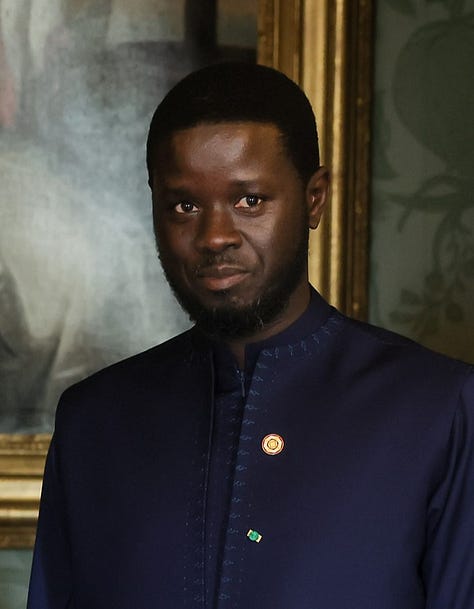🔅 Senegal's President: Style Icon
Africa's Electric Revolution is on 2 Wheels & A Desperate Mum Becomes an Award-Winning Skincare Entrepreneur
Oops, Wrong Country! In Monday's newsletter, the wrong map accompanies our Lesotho article. Thanks to eagle-eyed Gilbert for catching our Malawi-instead-of-Lesotho blunder. 😅
Image of the Day
Good Morning from Ghana

Spotlight Stories
Senegal's President: Style Icon



Move over, Milan Fashion Week – the real style icons are in Senegal's presidential palace. President Bassirou Diomaye Faye and Prime Minister Ousmane Sonko have been turning heads with their "tradi-modern" outfits, a blend of traditional Senegalese garb and Western fashion that's got the country's young professionals rushing to their tailors.
"Clothing-wise, he beats every other president in the world," gushed a Senegalese about President Faye's fashion sense. "His tailor should get a medal," declared another. And it's not just the president – Prime Minister Sonko has been rocking the tradi-modern look since 2016, thanks to designer Ousseynou Owens Ndiaye.
So, what exactly is tradi-modern? Think of it as a fashion mash-up, borrowing elements from the classic Senegalese boubou and giving them a modern, urban twist. The quintessential tradi-modern garment is the "demi-saison," a tunic-like top with a round or Mandarin collar, a row of buttons that stops at the chest, and a length that falls somewhere between a shirt and a traditional boubou.
But the tradi-modern wardrobe doesn't stop there. Tailors are getting creative, adding African fabric yokes, bogolan or wax prints to sober tunics, and even throwing in some European-inspired cufflinks for good measure. The result is a style that's both professional and proudly Senegalese.
President Faye is also a fan of the "Saharan," a local take on the classic European suit. Gone is the lapel collar, replaced by a sleek Mandarin collar, with subtle seams and slits giving it a distinctly African flair. As designer Xalil Cissé puts it, it's "close to the abacost of the Zaire era, that famous Congolese garment: elegant, but different from the European suit."
But this isn’t just about fashion – it's about national pride. "Young people are looking for a kind of African pride through their clothing," explained Owens Ndiaye, whose brand now employs 15 people and has boutiques across the sub-region. "The main idea of tradi-modern is to favor 'Made in Senegal'."
Of course, the "Made in Senegal" narrative isn't without its challenges. Most fabrics are still imported from Turkey, Asia, or Europe, and designers are calling on the new authorities to support the creation of a solid domestic textile sector.
But for now, Senegal's young professionals are embracing the tradi-modern look with gusto. And with the country's top leaders setting the fashion agenda, it's safe to say that the tradi-modern wave is just getting started.

Shalom Lloyd: From Desperate Mum to Award-Winning Skincare Entrepreneur
When life gave Shalom Lloyd a baby with severe eczema, she made... skincare products!
This Nigerian-British pharmacist and self-proclaimed "scientist through and through" wasn't about to slather her precious newborn in steroids. So, she rolled up her sleeves, remortgaged her home, and got to work in her kitchen, whipping up a concoction of shea butter and other natural ingredients.
Lo and behold, within three days, her son Josh's skin started to improve drastically. Shalom had her "eureka" moment, and Naturally Tiwa Skincare was born.
What started as a desperate mum's quest to soothe her baby's skin quickly grew into a thriving business. Shalom registered Naturally Tiwa Skincare in June 2016, and by March 2018, she was employing about 70 women at two shea processing plants in Nigeria.

"It's not philanthropy, it's not aid, it's trade," Shalom explains. "Yes, I am empowering women, but they're working for their living."
The raw materials are processed in Nigeria, then sent to the UK for manufacturing, testing, and packaging.
Naturally Tiwa Skincare has found its niche in providing solutions for people with skin conditions, cancer patients undergoing chemotherapy or radiotherapy, and menopausal women.
"We're small but mighty," Shalom says with a grin. (By the way, she collected her MBE for services to international trade and to women in business, at Windsor Castle in May)
When asked about the challenges of being a black female business owner, Shalom shrugs it off.
"I went to university in Ukraine in the 80s, you could count the black people with half your finger," she says. "I don't care. I just want to go out there and do what I need to do - do the right thing - make the world a better place and make money doing it - simple."
And that's exactly what she seems to be doing.
Africa's Electric Revolution is On Two Wheels
Imagine cruising through Nairobi's bustling streets on an electric motorcycle, the wind in your hair, and the satisfying knowledge that you're saving money and the planet at the same time.
Well, that's exactly what Stephen Omusugu, a two-wheel-taxi man from Kenya's capital, is doing. And he's not alone. Nairobi is buzzing with thousands of e-bikes and dozens of electric-vehicle startups. Even Uber has jumped on the bandwagon, launching its first e-bike fleet in Africa right there in Nairobi.
In the first 6 months of 2024, the number of EVs in Kenya tripled. Talk about an electric revolution. But it's not just Kenya that's feeling the electric love. Uganda's capital, Kampala, saw the number of electric motorcycle taxis triple over the past year. Rwanda's capital, Kigali, has about 3,000 e-bikes courtesy of Ampersand, a leading EV startup. And Spiro, the continent's largest EV manufacturer, boasts 20,000 e-bikes zipping around Africa.
The real showstopper, though, is Ethiopia. They went all in, becoming the first country in the world to ban the import of all petrol- and diesel-powered vehicles. Now, they've got over 100,000 EVs cruising their streets.
So, what's driving this electric revolution? For one, it's all about the Benjamins (or the shillings, or the birr). Despite higher upfront costs, the lifetime cost of an e-bike is lower than its petrol-powered cousin. Charging and maintenance are cheap.
Of course, there are some speed bumps on the road to electric utopia. Most EV startups are still trying to prove they can turn a profit, and battery infrastructure isn't cheap. Plus, some governments are still subsidizing fuel, making it harder for EVs to compete.
But even if the electric revolution stays confined to the big cities, it could make a huge difference for the people living there. Fewer pollution-spewing vehicles means cleaner air and healthier lungs. 🌿
Food for Thought
“The one who asks is not poisoned by mushrooms.”
— Guinean Proverb





